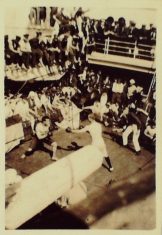Our Colonel, Henry Abel Smith1, was not passed for active service and the W.O. instead promoting Gurney Sheppard2, the 2nd in command to be Colonel, sent a ghastly old dug out Colonel Harrison3 who had commanded the Leicestershire Yeomanry many years before, to take command.
He arrived on the eve of our departure for Egypt and never while commanding took the trouble to change his badges from Leicestershire to Hertfordshire Yeomanry.
He knew less than we did about soldiering and was generally tight. It was said that you could easily get tight from the smell on his breath.
A hopeless individual.
Luckily soon after we got to Egypt he had D.T. after 30 whisky bottles were found under his bed and was sent home. Gurney Sheppard then assumed command.
The men in squadron (A) came from round Watford chiefly with one troop of Londoners commanded by Ralph Barnett4.
The other officers were –
Major Hugh Wild5 in command.
Captain Archie Clayton6, second in command.
Lieut. Ralph Barnett4.
T.H-H7 and W.H-H
Arnold Ward8 – a M.P. fat, uncountry and a bad rider, son of Mrs. Humphrey Ward the novelist.
We naturally always considered that we were the best squadron in the regiment and we probably were as Archie Clayton was an enthusiastic and knowledgeable soldier and kept us all, including our Squadron Leader, up to the mark.
My troop consisted of men living round Munden9 whose home and background I knew. My Troop Sergeant, Bert Pusey, lived at Leavesden and was a local horse dealer and farmer. A first class man and an excellent horseman.
The Herts. Yeomanry band did not accompany us abroad, the men in it volunteered for foreign service and were fit were made batmen and mess waiters. I was the first and last person to have a sergeant s a batman.

boxing on SS Ionian on the way to Egypt
We embarked at Southampton and sailed to Alexandria in convoy, 2 lines of ships escorted by 4 cruisers.
We steamed at about 12 knots. Could not go faster as the convoy had to keep together and its pace was regulated by a slow ammunition ship.
We were passed by another convoy in the Mediterranean of 23 ships taking Indian troops to France.
Our convoy had about 40,000 troops on board with one ship full of horses.
The voyage took from September 10th to 25th. It was uneventful so far as submarines were concerned. Ralph Barnett4 was in charge of all the horses that we took on a separate ship.
We did a lot of training during the voyage, learning semaphore etc. or , in my case, trying to.
Thurstan’s first child – Diana – was born just before we left England and poor Thurstan had a worrying time on the voyage thinking about Viola.
On arrival at Alexandria we had a terribly tiring day unloading the ship but all went well except for 2 lots of saddles that fell into the sea and one mare that foaled on the dock-side. This is reported in my diary as the worst day of the war so far !
Notes:
- Abel Henry Smith (6th December 1862 – 10th November 1930) Served 1st/1st Hertfordshire Yeomanry August – September 1914; 2nd/1st Hertfordshrie Yeomanry September 1914 – April 1916; and in command of Territorial Force Depot, Hertford May 1916 – January 1917 (‘B’ List) He lived at Woodhall Park near Hertford. Col Abel H Smith, aged 51, Smith failed to pass as fit for service abroad.
- Major Samuel Gurney Sheppard (23rd March 1865 – 21st August 1915) Killed in action 21st August 1915 in attack on Chocolate Hill, Gallipoli. He had been raised to temporary Lt/Col when he replaced Lt/Co Harrison. His younger brothers Edward Byas and Gerald Arthur also served in the Great War.
- Lt/Col Thomas Elliot Harrison D.S.O. (14th June 1862 – 3rd March 1939) Recalled from retired list, Leicestershire Yeomanry, to be Lieutenant-Colonel, Hertfordshire Yeomanry 9th September 1914. He commanded 1st/1st Hertfordshire Yeomanry 1914 – January 1915 in Egypt. He was transferred to Territorial force Reserve (Regimental List) 19th January 1915.
- Ralph Francis Barnett (1882 – 1968) of A Squadron was in charge of the regiment’s horses which sailed in the S.S. Messaba. Five ships transported 3,000 horses. Barnett was appointed Lieutenant A Squadron, Hertfordshire Yeomanry, 1st February 1914. Served 1st/1st Hertfordshire Yeomanry August 1914 – August 1918 (A Squadron – Egypt, Gallipoli, Temporary Captain 28th August 1915)
- Hugh James Wylde (16th April 1880 – ?), Major to command A Squadron 25th August 1913. Served 1st/1st Hertfordshire Yeomanry 1914 – May 1916 (commanding A Squadron – Egypt; Dardanelles; Wesern Desert)
- Archibald Charles William Clayton (24th October 1867 – 1944), Captain. Served 1st/1st Hertfordshire Yeomanry September 1914 – October 1915 (A Squadron Egypt; Dardanelles. Temporary Major while commanding squadron 28th August 1914); and November 1916 – April 1919 (D Squadron – Mesopotamia. Commanding squadron. Despatches twice.)
- Thurstan Holland-Hibbert, Wilfred’s older brother.
- Arnold Sandwith Ward (8th November 1876 – 1st January 1950), Liuetenant. 1st/1st Hertfordshire Yeomanry August 1914 – June 1915 (A Squadron – Egypt) and January – June 1916 (Egypt); commanding a convalescent camp, Cyprus June – August 1915.
- Munden Estate has been the home of the Hibbert and later Holland-Hibbert family since 1828.






Add your comment about this page